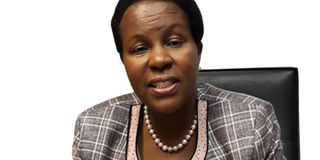It is no longer wining, dining at diplomatic missions

Prof Joyce Kikafunda, Uganda’s High Commissioner to Australia. PHOTO BY HALIMA ABDALLAH
What you need to know:
- There are 2,000 Ugandans living in Australia, with most of them being in Sydney
- On the other hand, New South Whale University is partnering with Gulu University. The programmes in these two universities were established together
What are your roles in the pacific generally?
One of my roles is to promote and protect Uganda’s mission in this region. I promote bilateral relations. I know we have good relations with these countries, but we have to nurture the relationships that we have cultivated.
I also take care of the needs of Ugandans in the Diaspora. There are 2,000 Ugandans living in Australia, with most of them being in Sydney.
I also promote commercial and economic diplomacy. It is no longer drinking and wining, we have work to do to promote our economic and diplomatic interests because we need the foreign direct investment to flow into our country.
Australia is hardly known to Ugandans and the reverse is true. What economic interests, for example, are you pursuing?
The mining sector is one area we are looking at. We have a lot of minerals such as copper, iron ore, zinc, but the sector remains at infancy. Australia’s mining sector is one of the top in the world and so we would like to have their companies invest in our country. Uganda is looking at all avenues to get out of poverty and the mining sector is one area that can raise the revenues and lead us out of poverty.
What progress is there to show, as per your mission?
I have been talking to companies, but it takes time to get the investors on the ground. What is important is to start the process. Our oil and gas sector has Armour Group, an Australian company which has an exploration license. On agriculture, we want help on commercial scale irrigation, agro-processing and we know Australia has all the technologies.
Australia is also known for good education, especially higher education. At the moment, Uganda has two education partnerships with Australian universities. Makerere University is partnering with the Murdock University. On the other hand, New South Whale University is partnering with Gulu University. The programmes in these two universities were established together.
What are these programmes?
In Gulu University, they are doing capacity building for staff, student scholarships that have been ring-fenced for students from Gulu University to study in the University of New South Whales, student exchanges and providing technical support to the faculty of technology. The University of Western Australia has also announced a new partnership for medical courses for Gulu University. On the other hand, Makerere University has programmes on cancer, peace and armed conflict resolution.
There are so many hotels in Australia, implying there are many visitors. What are you doing about our tourism industry?
Tourism is a flagship sector for our development. I also know that Australians travel a lot, but they stop in Kenya. It is my job to make sure they include Uganda in their itinerary. However, everyone must do their part to maintain peace and security, build necessary infrastructure such as airstrips and stop overs.
Australia has very stringent visa processes. Does it bother you that it makes travels nearly impossible?
That is true. Sometimes people miss important functions or study time because of visa issues. We have brought it up, but they say that is their policy. However, Ugandans can come for studies because it is difficult to get a visit visa.
Australia is a vast country. How do you working there?
There is a big distance and so that makes tickets expensive. Yet we have a lot of work to do to promote Uganda in this country which is so isolated. We recently had a travel industry show in Sydney and a trade and tourism exhibition in Perth. The two places are about five hours apart by air.
What is the fate of the Ugandan athletes who disappeared in thin air in Sydney?
The athletes handed themselves to Australian authorities after their three-month visa expired. They registered as refugees.
Unfortunately, the mission has never been informed officially about the athletes that were looking for asylum. So we have no knowledge of their situation. It is only when we are contacted by Ministry of Foreign Affairs and Trade, or even by the concerned people themselves, that we act.
What else would you like the public to know?
Australia is beautiful country. You can access education, trade and technologies, so we can develop resources for mutual benefit.




